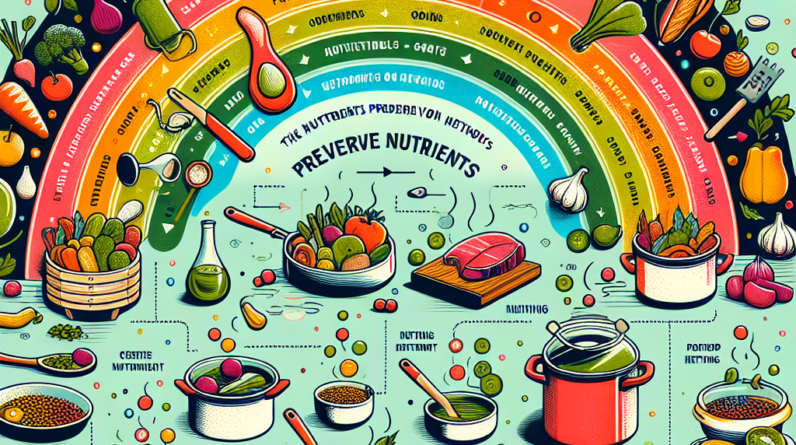
Retaining Vitamins and Minerals
Understanding Nutrient Loss
When we cook food, there’s often this common misconception that we’re actually enhancing its nutritional profile. The truth is, in many cases, we’re losing a lot of important vitamins and minerals in the process. Overcooking veggies or boiling them too long can drain them of their goodness. This is something I’ve learned through trial and error in my own kitchen. Now, I’m more conscious of how I prepare my meals and how certain methods can make a big difference in retaining those essential nutrients.
Get a Huge Discount and Bonus! Try for 90 Days Risk Free
For example, water-soluble vitamins like Vitamin C and some B vitamins are particularly sensitive to heat and water. So, if we’re steaming or boiling, it’s pivotal that we keep the cooking time to a minimum. I’ve found delight in experimenting with different cooking times to find that perfect balance where the flavor shines but the nutrients stay intact.
Cooking Methods that Preserve Nutrients
Several cooking methods actually do a great job of preserving essential vitamins and minerals. Steaming, for instance, is one of my go-to techniques. It’s quick and keeps those vibrant colors and nutrition locked in. Sautéing with just a bit of healthy oil can also be fantastic. Plus, it brings out flavors in a way that boiling just can’t. I’ve loved seeing how these methods transform bland vegetables into vibrant dishes.
A great little tip I picked up is to use the cooking water from boiled vegetables in soups or sauces. This way, we’re not throwing away the nutrients that leach into the water. It’s a small change, but it makes such a difference! Trust me, once you start thinking about food this way, your cooking game changes for the better.
Balancing Cooking Techniques
Finding the right balance in cooking methods is a lesson I’ve truly cherished. Not every dish needs the same treatment! For instance, I prefer to grill certain vegetables like bell peppers or zucchini, while I’ll steam broccoli. Each veggie has its own ideal method that enhances its unique flavor while keeping the nutrients alive.
I aim to be more mindful and intentional with my choices in the kitchen. Mixing methods has also helped me develop more interesting and diverse meals – and honestly, I think it adds a lot of fun! My family appreciates it as much as I enjoy preparing it. We regularly have ‘experiment nights’ where we just try out cooking different ways together.
Improving Digestibility
Chemical Changes During Cooking
Cooking isn’t just about flavor; it’s indeed a science! The chemical changes that occur during various cooking methods can significantly affect how our bodies digest food. For instance, cooking tomatoes releases lycopene, a powerful antioxidant that’s easier for our bodies to absorb when heated. Learning this has opened my eyes to the intricate romances between food and our bodies.
I’ve also noticed that cooking certain proteins, like chicken or beans, makes them much easier to digest. Before I really understood this, I often struggled with bloating after meals. It turns out cooking changes the structure of these proteins and helps our bodies break them down more effectively. So, embracing some cooking techniques has genuinely made me feel better overall.
Supporting Gut Health
An interesting facet of cooking that I’ve come to embrace is its relationship with digestive health. Fermented foods, for example, are a staple in my diet now. They not only promote gut health but also introduce beneficial bacteria that soothe my system. Eating more lightly cooked or raw veggies has also improved my digestion. To max out on these benefits, I experiment with stir-fries or quick one-pan meals. It’s fun to get creative!
Get a Huge Discount and Bonus! Try for 90 Days Risk Free
Through various cooking methods, I’ve become aware of how they influence my gut health positively. And honestly, experimenting in the kitchen has made me love cooking even more. I often tell friends that it feels like I’ve opened a whole new chapter in eating healthy, and it’s much more enjoyable now.
Personalizing it to Your Taste
We all know that cooking should be an expression of our tastes. Preserving nutrients does not mean we have to sacrifice flavor! I have found that experimenting with herbs and spices while cooking can make a huge difference. For instance, a sprinkle of garlic powder or fresh basil can take a dish from ‘meh’ to ‘wow’ without losing out on health benefits.
When I cook at home, I aim to create a balance of health and taste. Adapting cooking techniques to fit my personal preference has been a journey! It’s about finding what works best for my palate while ensuring I get the most nutrition possible. Cooking is personal, and we should embrace that!
Maximizing Meal Prepping
Simplifying Weekly Cooking
Meal prepping has been revolutionary for my lifestyle. It allows me to choose cooking techniques that maintain nutrient integrity while fitting into the busyness of life. By preparing meals ahead of time, I can focus on those nutrient-resistant methods without the daily stress of cooking.
Need a Serious Energy BOOST? Huge Discount Try for 90 Days Risk Free
Plus, having healthy meals ready to go encourages me to make better choices rather than reaching for convenience snacks. I usually dedicate Sundays to meal prep, and I’ve turned my kitchen into this thriving hub where I choose nutrient-preserving cooking methods for my weekly meals.
Enhancing Variety
One perk of meal prepping is the variety it allows in our diets! Using different cooking methods throughout the week means I’m never bored with what I’m eating. From grilled chicken and steamed broccoli to roasted sweet potatoes, my meals have become colorful and exciting, yet still nutrient-dense.
Good Health Solution is Easier Than Most People Think!
Take a Look for Yourself!
Not to mention, I can try out new recipes during my meal prep sessions! I love flipping through food blogs and finding new ways to cook familiar ingredients, advocating for both taste and health. It’s all about creativity for me!
Time-Saving Benefits
Let’s be real; who doesn’t want to save time in the kitchen? When I started meal prepping, I noticed that my cooking time decreased dramatically during the week. With everything already prepped, I can quickly reheat and enjoy a nutrient-dense meal without fussing over the stove every single night.
The ease of reheating or assembling meals has made my weeknight dinners way less stressful. Plus, knowing I’m nourishing my body with wholesome ingredients makes me feel good. Meal prepping has been a game changer for my overall health and wellness, and it doesn’t feel like a chore anymore!
Environmentally Friendly Practices
Reducing Food Waste
One of the unexpected perks of adopting cooking methods that preserve nutrients is the reduction of food waste. I’ve become increasingly conscious of how much I throw away and realized that with careful planning and cooking techniques, I waste so much less. Using the entire vegetable, scraps become vegetable stock or compost instead of just going in the trash bag.
It’s amazing what a difference it makes to my budget and the environment. By adopting mindful cooking methods, I feel like I’m contributing to a larger cause while still taking care of my health. Cooking in sustainable ways has encouraged me to embrace whole foods and seasonal produce. It’s a win-win!
Choosing Sustainable Ingredients
When I think about preserving nutrients, I always consider where my ingredients come from. Choosing local, organic produce not only supports the community but it also means healthier food options generally contain fewer pesticides and chemicals. I’ve found that my local farmers’ market is a treasure trove for fresh veggies that I can cook in ways that maximize their nutritional benefits.
I’m mindful about selecting ingredients that not only taste good but also align with eco-friendly practices. It feels great to know I’m making better choices in the kitchen that reflect my values. Trust me, knowing exactly where my food comes from gives me a greater appreciation for meal time.
Implementing Energy-Efficient Methods
Finally, consider how cooking techniques can be energy-efficient! I’m all about using my slow cooker or pressure cooker to prepare meals. These methods are not only great for preserving nutrients but they often require less energy compared to traditional stovetop or oven cooking. It’s gentle on my wallet and the planet!
I’ve loved discovering energy-conscious gadgets that not only make cooking easier but also have a smaller carbon footprint. As we think about how to create nourishing meals, it’s equally essential to consider how those methods impact the world around us. It truly brings a sense of fulfillment.
FAQs
1. What cooking methods help preserve nutrients the best?
Steaming, sautéing, and grilling are excellent options. These methods help lock in the vitamins and minerals while enhancing flavor.
2. Why should I care about nutrient preservation in cooking?
Preserving nutrients ensures you’re getting the most health benefits from your food. It maximizes the vitamins and minerals your body needs for optimal functioning.
3. Can meal prepping help in maintaining nutrient-rich meals?
Absolutely! Meal prepping allows you to plan your meals around nutrient-preserving methods and ensures you have healthy meals ready to go for the week.
4. How does cooking affect digestion?
Cooking can enhance digestibility by breaking down tough fibers and proteins, making it easier for your body to absorb nutrients. Certain cooking methods, like fermentation, also promote gut health.
5. Are there any environmentally friendly cooking methods?
Using local ingredients, reducing food waste, and choosing energy-efficient cooking appliances are all practices that can make your cooking more sustainable and environmentally friendly.








